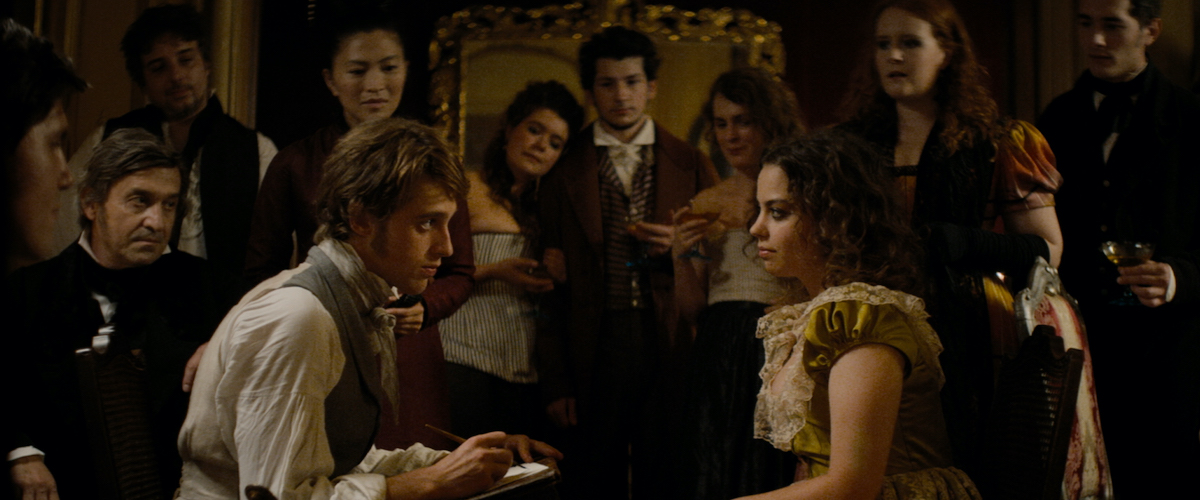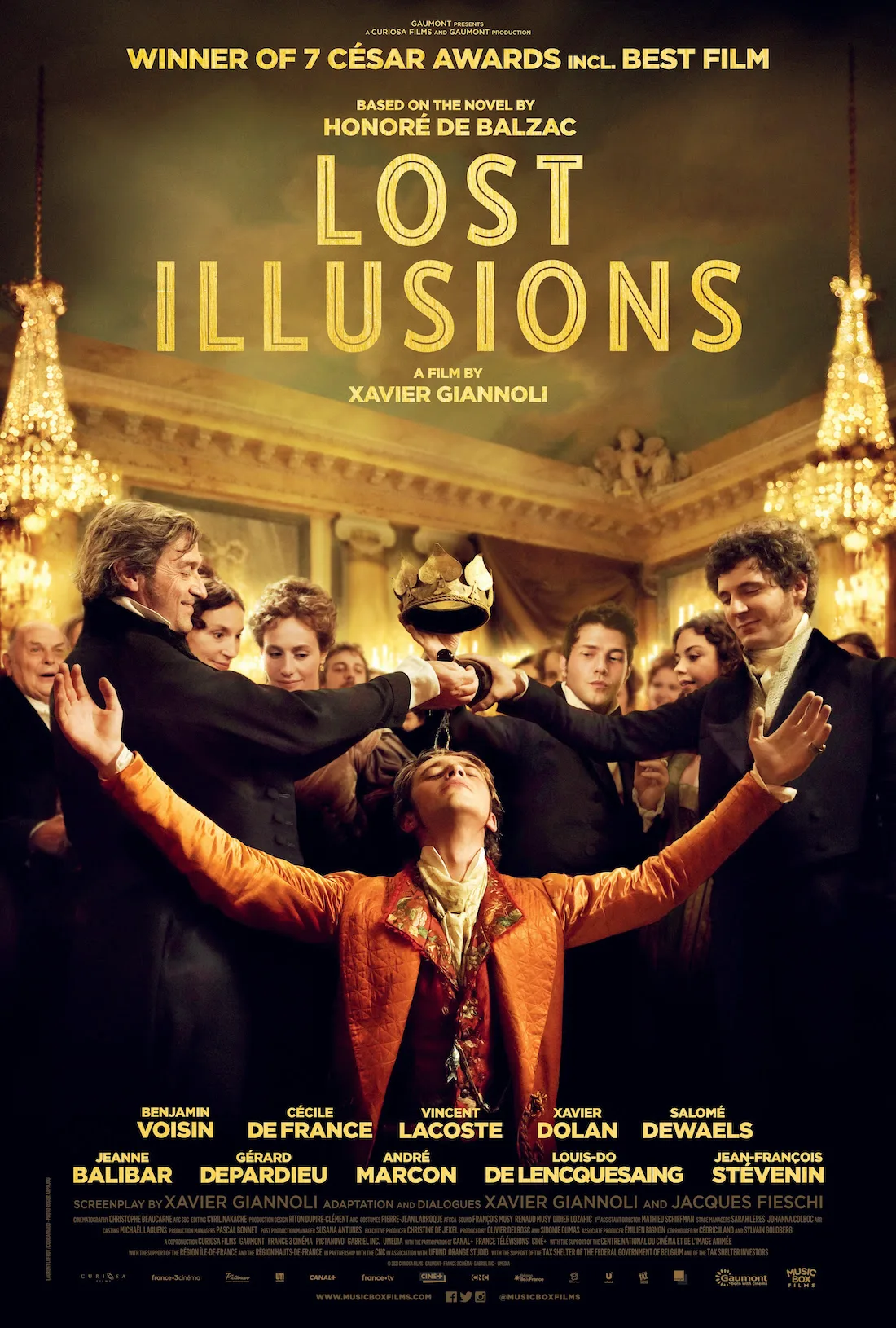“Even today in Paris, people wonder how his story could have happened, what movement of the world swept him away.” Said in voiceover within the first five minutes of “Lost Illusions,” these words point the way towards the end. Those who read Honoré de Balzac’s novel, originally serialized in the late 1830s and early 1840s, already know the roadmap from hopeful innocence to lost illusions. To those who haven’t read it, the voiceover clues them in instantly. This is a cautionary tale about selling out your gifts to the highest bidder, about how naïveté doesn’t stand a chance against the kind of corruption on display in Paris in the 1820s. Lucien’s life is described early on as “a tragedy,” and so even in all the scenes of triumph that follow, impending disaster is always present.
Xavier Giannoli’s film adaptation of Balzac’s book leans heavily on voiceover, so much so that some sequences are practically an audiobook with images attached. This could be seen as a negative, but in practice the voiceover-heavy sections are some of the film’s most successful. It’s hard to imagine another way to handle Balzac’s obsessively comprehensive presentation of all aspects of Parisian society, the striations and hierarchies at play in the intersecting incestuous worlds of entertainment, media, finance, art, sex, etc. Balzac’s book is as much about the world the characters circulate in as it is about the characters. To present the plot without all that context would leave you with little more than a soapy melodrama. But Balzac lays out how this intricate society works, and he does so not from a front-row seat but from on the stage itself. Voiceover like this is a risky choice, but here—especially since so many of the characters are writers—it seems appropriate.
Lucien (Benjamin Voisin) comes from humble beginnings. He lives out in the country, works at a small printing press, dreaming of being a famous writer. His poetry attracts a local woman, the aristocratic Louise de Bargeton (Cécile de France). The two begin an affair, even though she is a married woman, and she is so swept away she takes Lucien with her to Paris, parading him around. Her behavior causes a scandal, spearheaded by Louise’s terrifying cousin, the Marquise d’Espard (Jeanne Balibar). The pressure gets to Louise and she drops Lucien like a hot potato. The kid was in Paris for literally a couple of days before he is cast aside.
He finds a mentor in journalist Etienne Lousteau (Vincent Lacoste), who brings him to work at one of the many opposition presses in operation at the time, and shows him the ropes. The world of journalism is astonishingly corrupt. Everything has a price, everything can be bought. Lucien catches on fast. Drawn into the demimonde, he falls in love with an adorable actress named Coralie (Salomé Dewaels), and gains a frenemy in Nathan d’Anastazio (Xavier Dolan), a “real” writer, emitting a controlled glow of success and charisma wherever he goes. Lucien wants what Nathan has. He wants to be Nathan. There are even suggestions that he wants Nathan, period. (After Coralie first meets Lucien, she asks her friend, “Are you sure he likes women?”) One of the big publishers in town is a man named Dauriat (Gérard Depardieu), who favors Nathan, and barely gives Lucien the time of day. Lucien knows he is squandering his gifts writing the crap that he does, “fake news” for an undiscerning public. (There are multiple connections to today’s media world, should you be inclined to look for it.)
The middle section of the film—where Lucien rises to the top of his new profession, all as the voiceover tells us what we are seeing and what it means—is a beautiful piece of filmmaking, masterfully handled by Giannoli, along with cinematographer Christophe Beaucarne and editor Cyril Nakache. Everything is urgent, exciting, exuberant, the camera hurtling through the streets, through the theatre’s backstage area, through the clamorous newspaper offices. The section never stops to take a breath, and feels all of a piece, part of the same flow. The voiceover explains everything. It’s not enough to know Lucien works for the opposition press. We also need to know that the society is weary after the one-two-punch of the Revolution and Napoleon: they just want to chill out, make money, have fun. Opposition papers, anti-royalist papers, are all the rage, and the competition is fierce. We learn about theatre, and how reviews are paid for, how even applause (and/or catcalls) are paid for. It’s reminiscent of Robert De Niro’s voiceover in “Casino“: “Here is how this world works, let me walk you through it.”
The cast is excellent overall, with Lacoste and Dolan as the standouts. Lacoste is perfect as a man who is a lot of fun when he likes you, but dangerous when roused as your enemy. Etienne is soulless, heartless, corrupt, but his cocky self-pleased grin makes corruption attractive. Xavier Dolan mostly acts in the polarizing films he’s directed, so it’s fascinating to see him give a performance with someone else at the helm. He’s so contained and controlled, he knows his own power, he emanates ambiguous sexual energy, all of which means he is extremely compelling to watch. Voisin has a huge journey to go on from country bumpkin to city slicker to ruined man, and he is very effective and well-cast. The book makes much of his looks—Balzac refers to him as “a Greek god,” not-so-subtle “code” for what was really going on. Oscar Wilde, who counted Balzac as one of his main influences, understood. This aspect of the story really isn’t present, although it’s there in how Dolan plays his scenes, the flickers of unspoken thoughts in his eyes as he gazes intensely at Lucien’s face. Dolan is a flirt, a seducer, and his whispering conferences with Lucien have a kind of sexual charge that has to be deliberate. More could have been made of all of this.
Lucien’s downfall is tragic but expected. The voiceover told us it was coming. What is unexpected is everything leading up to it. Yes, it’s sad Lucien came to ruin, but Giannoli makes his rise look like so much fun.
Now playing in select theaters.




















